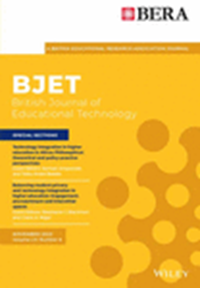Does community of inquiry really matter in understanding online learning? A confirmed perspective using mixed method
Abstract
High dropout rates in online courses, caused by potential factors such as financial issues, low motivation and poor self-regulation among learners, pose a significant challenge to the sustainable development of online education. Therefore, continuance of online courses has become a critical topic in both the academic and practical fields. By combining the Community of Inquiry framework (CoI) with Expectation-Confirmation Theory, this study introduces three new constructs—confirmed teaching presence (CTP), confirmed cognitive presence (CCP) and confirmed social presence (CSP)—into the research model to understand how confirmed expectations towards CoI determine online learners' course continuance intention. Utilizing a mixed-methods approach, the study conducted quantitative analysis on 409 learner surveys using partial least squares (PLS), followed by semi-structured interviews, which revealed the depth and breadth of the confirmed CoI expectations on learners' willingness to continue learning. Specifically, the quantitative results uncovered the differential effects of CTP, CCP and CSP on learners' course continuance intentions by elucidating the internal mechanisms. The interviews provided deeper insights by illuminating online learners' initial expectations as well as their pre-course and post-course expectations. The findings of the study not only provide evidence of the crucial role of confirmed expectations in shaping online learners' course continuance intention but also offer actionable recommendations for improving online course design and fostering lifelong learning.
Practitioner notes
What is already known about this topic
- Online courses have expanded in scale and attracted a large number of learners in recent years, the large base of online learners has brought tremendous and unprecedented challenges to online course development. A high dropout rate is especially considered as a severe issue for online course development.
- The issue of learners' continuance intention was often explored from a technological perspective and at the platform level by using Information system (IS) theories.
- The community of inquiry (CoI) framework was extensively utilized as a theoretical basis for understanding online learning experiences and its three elements—teaching, cognitive and social presences—have long been deemed as major antecedents that influence learners' online learning behaviours and intentions.
What this paper adds
- This paper integrated the community of inquiry (CoI) framework with Expectation confirmation theory and proposed three new variables: confirmed teaching presence (CTP), confirmed cognitive presence (CCP) and confirmed social presence (CSP).
- The study reveals the internal mechanisms by which the three confirmed expectations impact online learners' courses continuance intention. This implies that different confirmed expectations may have varying effects on online learners' learning behaviour.
- This research collects data from multiple sources to comprehensively explore online learners' expectations and perceptions. It also sheds light on the importance of learners' actual participation in the learning process for predicting their behavioural intentions.
Implications for practice and/or policy
- The finding that learners' confirmed expectations impact their online course continuance intention conveys an important message to course practitioners: exaggerated or false claims for the online course must be avoided to prevent students from forming unrealistic expectations.
- Improving online learners' course completion rate cannot be hinged upon simply and blindly fostering and extending the three presences. Instead, knowing learners' confirmed expectations of the three presences allows course practitioners to reconsider and organize the important course elements.
- The research reveals the distinct role that each confirmed presence plays in promoting online learners' course continuance intention and, meanwhile, expands the understanding of learners' learning needs and experiences. Practitioners could make timely and appropriate strategies based on these to better motivate course learners' engagement and retention.



 求助内容:
求助内容: 应助结果提醒方式:
应助结果提醒方式:


